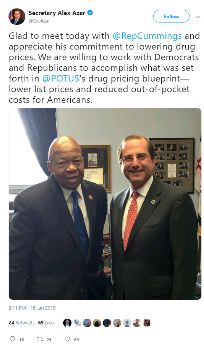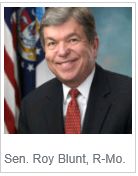Below is this week's "Capitol Hill Healthcare Update," which is posted on Mondays when Congress is in session. We're posting on Tuesday this week because of the Martin Luther King, Jr. federal holiday. Highlights this week: Gottlieb warns FDA's funds running low as shutdown continues; House Dems launch sweeping probe on drug prices, Senate approves Medicaid measures, and more.
SHUTDOWN UPDATE: MEXICAN STANDOFF
The partial government shutdown, now in its second month, shows no signs of abating, as the White House and congressional Democrats continue to be at loggerheads over funding for a wall along portions of the U.S.-Mexico border.
Congress was supposed to be in recess this week, but the House and Senate are in session even as leaders have no plans to meet with President Donald Trump to try to end the standoff, now in its 32nd day.
 The shutdown continues to affect the FDA, where 31 percent of the
agency's employees have been furloughed. That's down from
the 41 percent that the FDA said were furloughed last month.
The shutdown continues to affect the FDA, where 31 percent of the
agency's employees have been furloughed. That's down from
the 41 percent that the FDA said were furloughed last month.
Commissioner Scott Gottlieb tweeted that the FDA will exhaust all available funding in about four weeks. The agency has been operating on industry user fees paid before the shutdown began in December, when FDA's congressionally approved funding stopped. It cannot accept new user fee payments while the shutdown is ongoing.
Although the budgets for HHS and CMS were already approved by Congress, FDA's was not. Departments whose budgets remain unfunded are Agriculture, Commerce, Justice, Homeland Security, Interior, State, Transportation, and Housing and Urban Development, as well as several smaller agencies.
HOUSE PANEL BEGINS DRUG INDUSTRY OVERSIGHT
The House Oversight and Reform Committee last week sent letters to 12 pharmaceutical manufacturers, beginning what's expected to be an aggressive investigation into industry pricing practices.
The committee next week is scheduled to hold a hearing on drug prices.
Committee Chairman Elijah Cummings, D-Md., said his inquiry seeks detailed information and documents from the companies, which include AbbVie, Celgene and Sanofi. The letters ask for documents on price increases for drugs that treat cancer, kidney failure, diabetes and nerve pain. The letters also ask for details on company spending on research and development, advertising, executives' salaries, and corporate strategies to preserve market share and pricing power.
Cummings said the letters are just the first step in what he described as one of Congress' "most wide-ranging investigations in decades into the prescription drug industry's pricing practices."
AZAR MEETS WITH KEY DEMOCRAT, SENATE GOP ON DRUG PRICES
 HHS Secretary Alex Azar spent time on
Capitol Hill wooing lawmakers on the Trump administration's
controversial plans to lower prescription drug prices.
HHS Secretary Alex Azar spent time on
Capitol Hill wooing lawmakers on the Trump administration's
controversial plans to lower prescription drug prices.
Azar met privately with House Oversight and Reform Committee Chairman Elijah Cummings, D-Md., who is among the drug industry's sharpest critics in Congress. Cummings is backing anti-industry legislation that would allow the federal government to negotiate prices and permit importing drugs from other countries.
Cummings told reporters after the Azar meeting that he was hopeful congressional Democrats and the White House could strike a bipartisan deal to lower drug prices.
Azar also met with Republicans on the Senate Finance Committee, where he updated lawmakers on the administration's plan to link Medicare Part B reimbursements to an index of prices paid in foreign countries whose governments set prices. Azar is expected to announce a pilot project soon through the Medicare innovation center for reimbursing drugs administered in the physician's office.
The secretary came under sharp questioning from Republicans, some of whom expressed concern that Azar's plan amounted to importing other countries' price controls. Azar also discussed other proposals, including those that would require congressional action, such as removing the cap on Medicaid rebates, adding an inflation cap on Part B reimbursements and adding point-of-sale rebates in Part D.
SENATE APPROVES MEDICAID MEASURE
The Senate last week gave final congressional approval to legislation that would extend two Medicaid policies related to home- and community-based services.
The bill provides $112 million for grant projects to aid Medicaid beneficiaries with chronic conditions and disabilities transition from institutions to communities. The legislation also would renew for three months a federal provision that disregards a spouse's income when determining Medicaid eligibility for an individual receiving home- and community-based services.
The House approved the bill earlier this month, and it now goes to the White House for President Donald Trump's expected approval.
LAWMAKERS CALL ON REGULATORS TO SCRUTINIZE BMS-CELGENE DEAL
Two House lawmakers – one Democrat and one Republican – are calling on the Federal Trade Commission and the Department of Justice to "examine carefully" the proposed $74 billion acquisition of Celgene by Bristol-Myers Squibb.
 In a letter last week, Reps. Peter Welch,
D-Vt., and Francis Rooney, R-Fla., argued the merger would
"further consolidate the industry to the detriment of
competition" and likely lead to significant price
increases.
In a letter last week, Reps. Peter Welch,
D-Vt., and Francis Rooney, R-Fla., argued the merger would
"further consolidate the industry to the detriment of
competition" and likely lead to significant price
increases.
The letter was sent to commission Chairman Joseph Simons and acting Attorney General Matthew Whitaker. The merger is expected to close in the third quarter.
Earlier this month, Sen. Elizabeth Warren, D-Mass., criticized the proposed merger, tweeting, "Giant drug companies only care about one thing: raking in profits on the backs of patients."
PALLONE OUTLINES PRIORITIES TO LOWER DRUG PRICES
A key House Democrat last week said his top two priorities to lower prescription drug costs would be to allow the federal government to negotiate prices directly with manufacturers and to allow generic manufacturers to gain access to drugs protected by FDA's risk evaluation and mitigation strategy (REMS) safety program.
 Energy and Commerce Committee Chairman
Frank
Pallone, D-N.J., made the comments last week during a Capitol
Hill event featuring the Coalition Against Patent Abuse, a new group
aimed at "fighting abuses of the patent system" that it
said lead to higher drug prices.
Energy and Commerce Committee Chairman
Frank
Pallone, D-N.J., made the comments last week during a Capitol
Hill event featuring the Coalition Against Patent Abuse, a new group
aimed at "fighting abuses of the patent system" that it
said lead to higher drug prices.
Pallone said his committee will hold a series of hearings this year on drug prices, including on the REMS program and what he said were manufacturers' "gaming of the system" to extend their drug's patent protections.
BIPARTISAN BILL ON COMMUNITY HEALTH CENTERS INTRODUCED
Key senators last week introduced legislation that would renew federal funding for community health centers and four other federal health programs that are set to expire this fall.
The legislation by Senate HELP Committee Chairman Lamar Alexander, R-Tenn., and Sen. Patty Murray, D-Wash., the panel's top Democrat, would reauthorize community health centers for five years. Alexander said 1,400 centers nationwide provide healthcare services to 27 million Americans, many of whom live in rural areas.
 In addition to community health
centers, the bill also would reauthorize the National Health
Service Corps, the Teaching Health Center Graduate Medical
Education program, the Special Diabetes Program at the National
Institutes of Health and the Special Diabetes Program for
Indians.
In addition to community health
centers, the bill also would reauthorize the National Health
Service Corps, the Teaching Health Center Graduate Medical
Education program, the Special Diabetes Program at the National
Institutes of Health and the Special Diabetes Program for
Indians.
Alexander's committee will hold a hearing on the bill next week.
Sens. Roy Blunt, R-Mo., and Debbie Stabenow, D-Mich., earlier this month introduced legislation to reauthorize and increase funding for the Community Health Center Fund and the National Health Service Corps.
The content of this article is intended to provide a general guide to the subject matter. Specialist advice should be sought about your specific circumstances.
